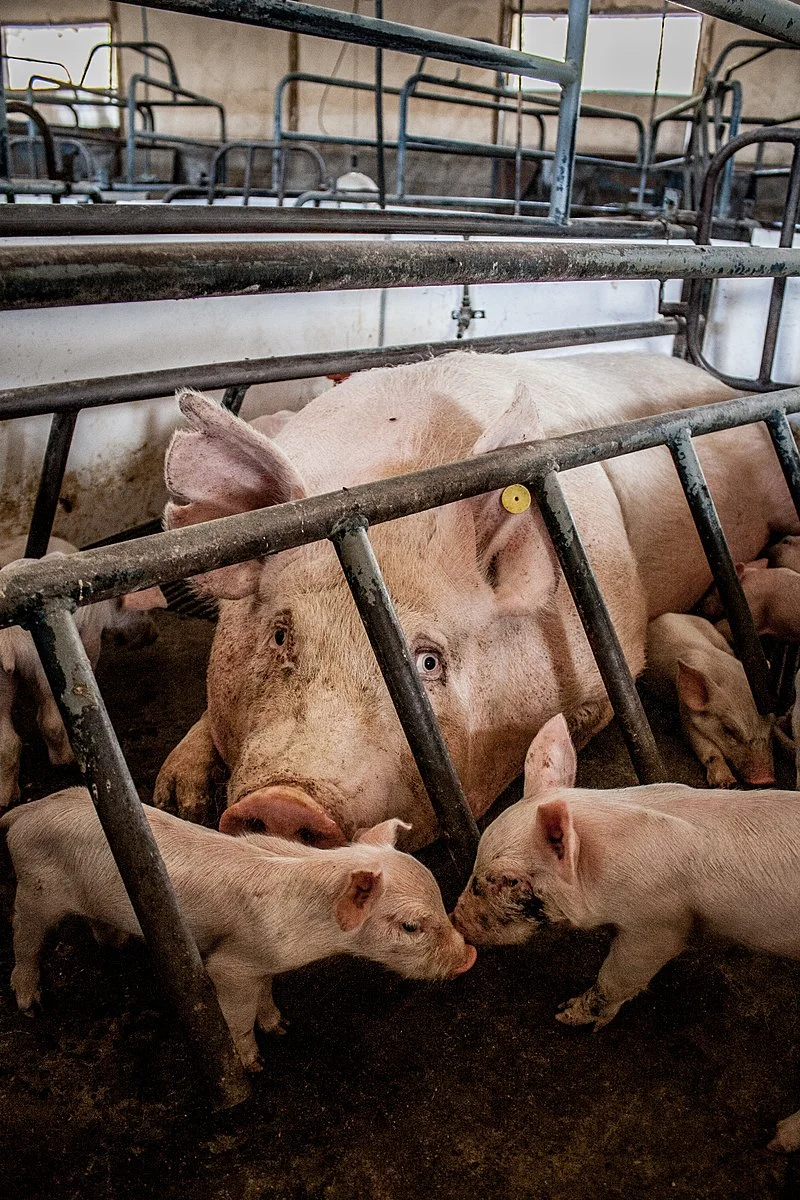“Green growth” and population denial doom our climate efforts
This article first appeared in Cosmopolis on December 29, 2023.
As the warmest year on record draws to a close, delegates from around the world just reached agreement, after 30 years of meeting on climate change, to transition away from fossil fuels. The legally nonbinding consensus to shift to renewable energy technologies came after delegates arrived via private jet in Dubai, the capital of one of the largest oil producing nations, to a conference presided over by the head of the UAE’s state-owned oil company, who used the opportunity to question the science supporting a phaseout of fossil fuels.
The conference for the first time devoted more than passing attention to the climate impact of our food systems, with a menu that was largely meat-free and agenda items focused on the outsized impact of animal agriculture on climate change. But the meat industry lobbyists present at the conference surely knew that they need not worry: the legacy of the 28th Council of the Parties is a vague agreement toward agricultural innovations to reduce emissions, rather than progress toward the global phaseout of animal agriculture that our climate and ecological systems need.
Against this backdrop it is not hard to understand why despite twenty seven previous such conferences, emissions have done nothing but climb. But if COP28 is an almost comical effort at window dressing our commitment to business as usual as the world burns, so is every other attempt to address our unfolding polycrisis that fails to acknowledge our growing population and exploding consumption. For throughout 30 years of convening to discuss how to address climate change without changing anything about how we live our lives, increased emissions from population growth have canceled more than three quarters of the emissions saved through energy efficiency and renewables over that period.
An indigenous warrior named Wolf, guardian of the camp, tends the sacred fire in the central teepee. (Photo: Christopher Ketcham)
Outside the farce that is COP28, even the most earnest strains of mainstream environmentalism have been hijacked by the notion that we can somehow heal the vast ecosystemic wounds caused by runaway technology with yet more technology. Our state of global ecological overshoot, comprising biodiversity collapse, the depletion of waters and soils, land degradation, habitat fragmentation, toxic and solid waste pollution, and rising resource scarcities, has been collapsed into “climate change,” conveniently for the merchants of growth as long as the story holds that we can address climate change without changing the way we live.
Yet cracks in the “green growth” facade are beginning to appear, as attention is trained on its devastating environmental and social costs. Renewable energy plants and transmission lines will have to be built, at an enormous scale, using fossil fuels. The technologies themselves require a host of materials like lithium, cobalt, copper and rare earth metals that must be mined at great environmental cost, often borne by indigenous people or by low-wage mine workers subjected to toxic dumping and wholesale displacement in places like the Democratic Republic of the Congo. Solar and wind energy and the infrastructure for transmitting their power requires far more land area than fossil fuel plants, with devastating consequences for wildlife. Meanwhile, carbon capture and storage is revealed to be an expensive, unproven, and largely useless windfall to the fossil fuel industries that have lobbied for its subsidy.
It is clear that to truly address the Great Unraveling that threatens the biophysical basis of our existence and that of every other creature on this planet, we must confront and ultimately dismantle the ethic of perpetual growth that underpins every aspect of our society, from our financial systems to our social safety nets. This prospect is daunting, as unlimited expansionism has been the unquestioned lodestar of Western society since the Industrial Revolution. Economic growth is seen as the solution to everything from confronting climate change to eradicating poverty - bizarrely, as income inequality has only grown in tandem with growth in GDP in the industrialized world.
Yet economic degrowth remains an easier sell than its equally vital companion, shrinking our population. Even among those who grasp the need to downscale the human enterprise, discussion of the population factor remains verboten. Forced population reduction efforts of the recent past have stained all efforts that openly target fertility - the vast majority of which have been rights-based and voluntary - with the blemish of coercion, and led to the silencing of discourse around population.
We can, and we must, move beyond the population taboo and acknowledge that the same growth-driven systems of oppression that lead to runaway population growth, also depend on the subjugation of women and control of their reproduction. Population discourse is shut down with arguments that fertility rates reflect cultural preferences, but cultural preferences in favor of child-bearing are the product of generations of forces that socialize and pressure women to have children, whether to carry on a family name, to grow a religious denomination, or to win a demographic war with competing ethnic or national groups. Pronatalism heavily biases and structurally coerces women (and men) in favor of childbearing. And by refusing to confront population growth, we are carrying water for the forces of oppression that drive it. In the shadows cast by the silencing of population discourse, pronatalist pressures - in the form of depopulation alarmism, baby bonuses and abortion bans - flourish, robbing us of the space to make thoughtful, authentic decisions about childbearing.
We must challenge population denial along with pronatalism and the growthism it serves. Recognizing population as a significant driver for ecological collapse, and as a viable target for benevolent policy interventions, opens the door to educational and family planning solutions that uplift girls, women, impoverished communities, and the natural world. At one time, international family planning investment led to substantial gains in lowered fertility, reduced poverty, and women’s education and empowerment, but these efforts were derailed. Today, international funding for family planning falls far short of meeting the unmet need of 270 million women who want to avoid pregnancy but are unable to do so due to patriarchal and religious barriers.
Image source: We Animals Media
A coordinated effort among nations and international NGOs could get vital family planning programs back on track. The United States, for example, could meet the entire global unmet need for family planning with a fraction of what it spends annually on subsidies for the meat and dairy industries or on its military budget.
While nations congratulate themselves on arriving at an agreement full of “half measures and loopholes,” it is clear that a different sort of commitment is needed to truly make a difference for our climate. Instead of continuing our relentless pursuit of “green growth” at all costs, the time is now to scale back our enterprise through interventions that uplift people, protect biodiversity, and dramatically reduce our emissions. Phasing out animal agriculture and investing massively in family planning are two levers that can have an enormous impact in a relatively short amount of time.



